Four dead whales washed up on a beach near Skegness in Lincolnshire, England, have experts baffled. Including the sperm whale that died on Friday night on a Hunstanton beach in East Anglia, a total of five sperm whales have become stranded and died on beaches on the east coast.
Experts are so far at a loss to explain why so many whales died at the same time in the same area. Some of the animals are believed to have died out at sea before being washed up on the beach.
The last whale to die, believed to belong to the same pod as those discovered during the weekend, was found by a walker in in Wainfleet, about five miles south of Skegness, were one was washed up on Saturday and another two on Sunday.
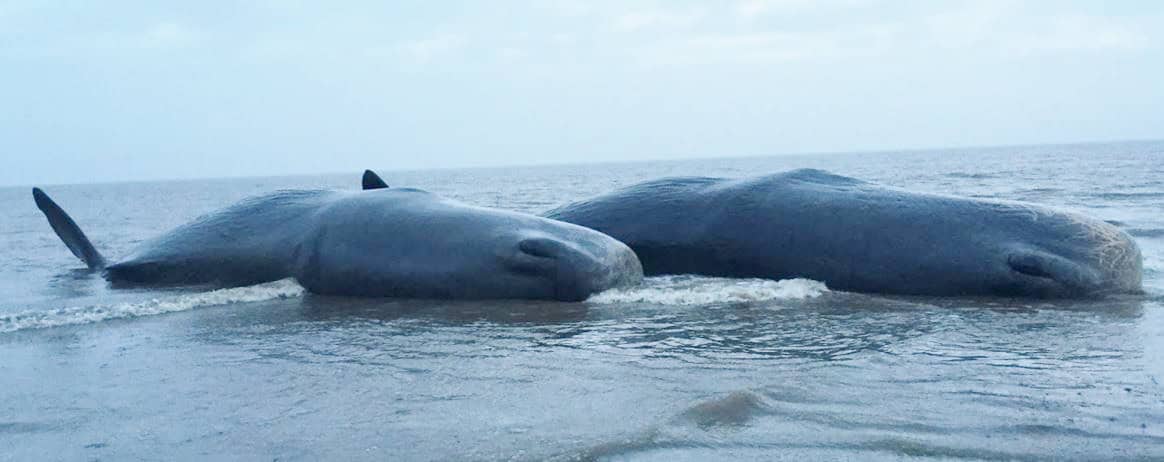 These two dead whales were discovered on Saturday. If they died at sea, what killed them? (Image: HM Coastguard blog)
These two dead whales were discovered on Saturday. If they died at sea, what killed them? (Image: HM Coastguard blog)
A Maritime & Coastguard Agency (HM Coastguard) spokesperson said:
“We can confirm there is a fifth whale and it is in Wainfleet. We have informed our Receiver of Wreck and the Zoological Society of London.”
HM Coastguard is advising people to stay away from the dead sperm whales that have washed up on the beach. It says a Nature Reserve Warden in the area informed HM Coastguard when he discovered two dead sperm whales, about 48 feet long, on Saturday 24th January at about 8.30 pm.
On Saturday morning a third dead whale was found washed up. Coastguard Rescue Teams from Chapel St Leonards and Skegness were at the scene and cordoned off the area.
Dead whales probably belonged to same pod
The Coastguard believes that the dead whales found on Saturday belonged to the same pod as the one that died on 22nd January on on Hunstanton beach. Nobody knows, at this stage, where the rest of the pod is.
UK Coastguard Richard Johnson said (before the fourth whale was found):
“We believe that the three whales at Skegness died at sea and then washed ashore. We are advising members of the public to stay away from the beach.”
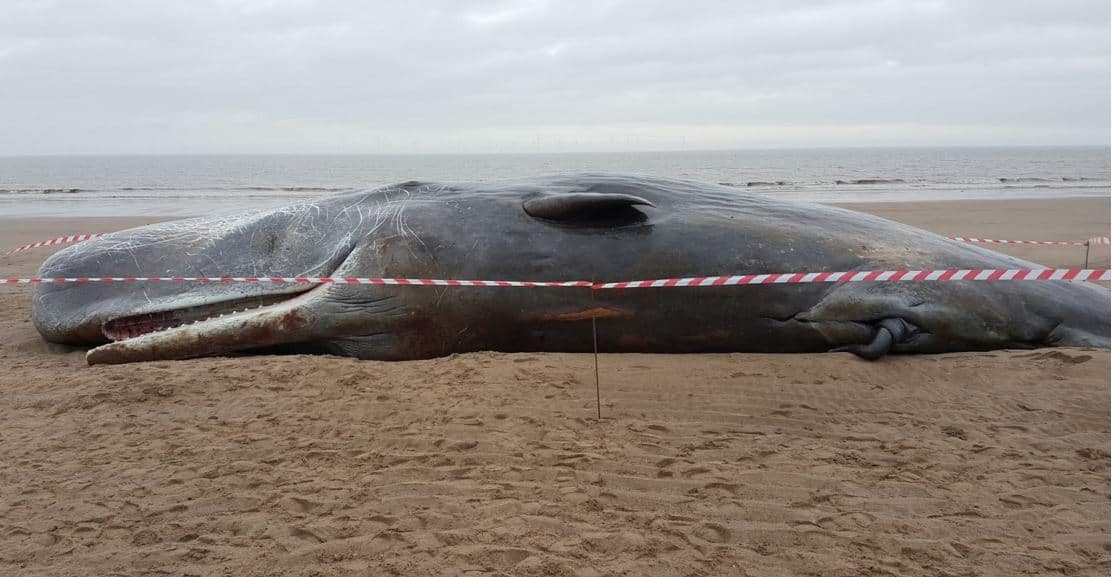 Third whale washed up on beach near Skegness. Rescue teams placed a cordon around it. (Image: HM Coastguard blog)
Third whale washed up on beach near Skegness. Rescue teams placed a cordon around it. (Image: HM Coastguard blog)
“We have informed the Receiver of Wreck and we are expecting an officer from the Zoological Society of London to attend the scene and carry out tests on the whales.”
Zoological Society of London and team investigating
According to the Zoological Society of London (ZSL), which is leading the UK strandings team, members have been busy investigating the strandings at Skegness and Hunstanton this weekend.
The Cetacean Strandings Investigation Programme (CSIP) investigates all cetaceans (porpoises, dolphins and whales), marine turtles and basking sharks that end up stranded around the British coastline.
ZSL says they are working to determine why these sperm whales were washed onto the beach.
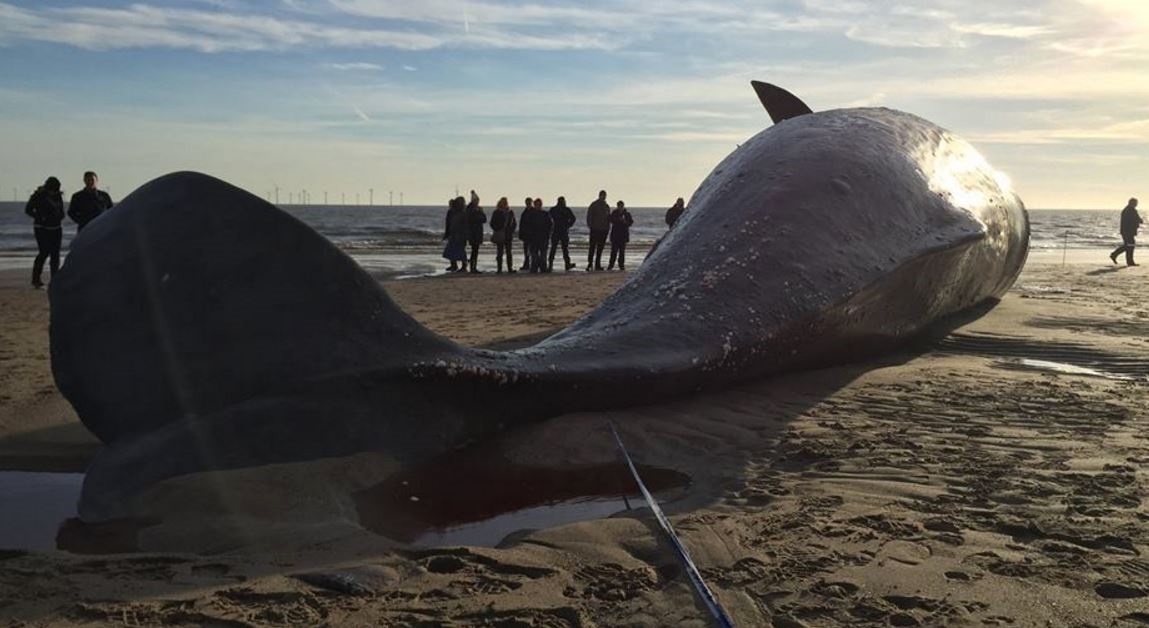 Members of the public have been asked not to get near the dead whales. (Image: Zoological Society of London Facebook)
Members of the public have been asked not to get near the dead whales. (Image: Zoological Society of London Facebook)
Some whale strandings are huge
Some whale strandings may involve a very large number of animals. Last year, a massive whale stranding created a frightening graveyard on a southern Chile beach were more than 337 sei whales had been counted. Experts said it was one of the biggest strandings ever recorded.
Biologist Vreni Haussermann, Ph.D., scientific director of the Huinay Scientific Field Station in Chile, told the Associated Press that she along with other colleagues made the discovery in June while they were carrying out an observation flight over her country’s fjords in the southern Patagonian region.
Dr. Haussermann and colleagues have been gathering samples in order to try to determine what might have caused so many deaths.
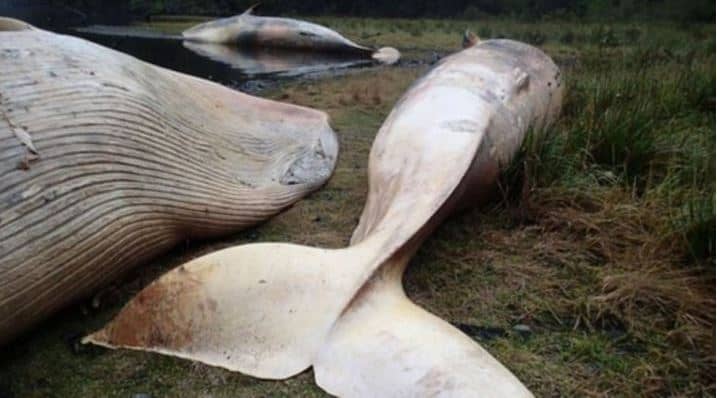 Some of the whales that died on a beach in southern Chile. (Image: El Dínamo)
Some of the whales that died on a beach in southern Chile. (Image: El Dínamo)
She said she had some conclusions why so many whales ended up dead on the beach, but could not disclose them until an article which is due to be published soon becomes accessible to the public.
The only hint she gave was that human intervention had been ruled out.
Pollutants in the sea and whale survival
Killer whales, also known as orcas, are facing extinction in European waters because of the lingering toxic effects of pollutants that were banned in the 1980s.
A study carried out by ZSL and published in Scientific Reports, gathered and analysed data on over 1,000 stranded or biopsied dolphins, whales and porpoises, and found that the blubber of killer whales and some species of dolphins in Europe contain among the highest levels of PCBs (polychlorinated biphenyls) worldwide.
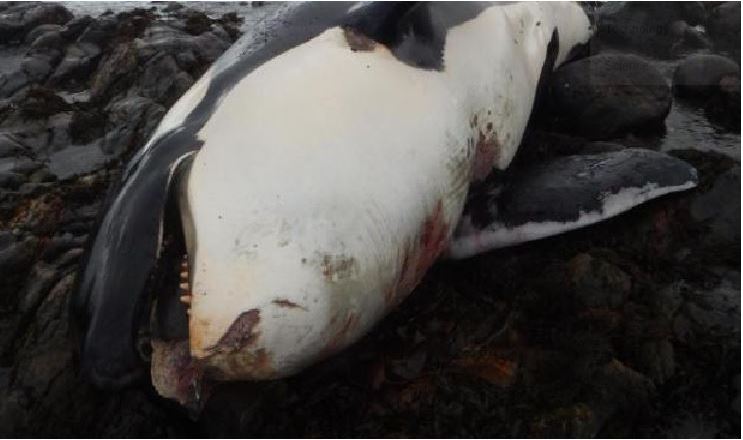 The dead orca that was stranded on Tiree, a Scottish island, earlier this month, has been identified as Lulu, a member of the West Coast Community of killer whales. (Image: whaledolphintrust.co.uk)
The dead orca that was stranded on Tiree, a Scottish island, earlier this month, has been identified as Lulu, a member of the West Coast Community of killer whales. (Image: whaledolphintrust.co.uk)
PCBs are a group of artificial chemicals once used in the manufacture of products including paints, flame retardants and electrical equipment. Exposure to PCBs is known to weaken cetacean immune systems as well as significantly undermining their ability to reproduce.
Lead author, Dr. Paul Jepson, a specialist wildlife veterinarian at the Institute of Zoology, part of ZSL, said:
“The long life expectancy and position as apex or top marine predators make species like killer whales and bottlenose dolphins particularly vulnerable to the accumulation of PCBs through marine food webs. Our findings show that, despite the ban and initial decline in environmental contamination, PCBs still persist at dangerously high levels in European cetaceans.”
“Few coastal orca populations remain in western European waters. Those that do persist are very small and suffering low or zero rates of reproduction. The risk of extinction therefore appears high for these discrete and highly contaminated populations. Without further measures, these chemicals will continue to suppress populations of orcas and other dolphin species for many decades to come.”
Co-author Robin Law said:
“Our research underlines the critical need for global policymakers to act quickly and decisively to tackle the lingering toxic legacy of PCBs, before it’s too late for some of our most iconic and important marine predators. We also need to better understand the various pathways through which these iconic species are able to accumulate such high PCB concentrations through their diets.”
Possible reasons for whale strandings
According to Whale Facts, historical records show that whales have been found stranded on beaches since at least 300 B.C. Below are some reasons offered by scientists:
– Injuries from man-made aquatic machines: as more ships navigate our oceans and global trade grows, so do the opportunities for whales to collide with ships, which either injure or disorient them, causing them to end up stranded on beaches.
– Water pollution: pollutant chemicals such as acid or gas make whales sick. Concentrations of pollutants within the animals are increasing.
– Man-made sonar: perhaps whales become confused, sick or disoriented by the use of man-made sonar, which might interfere with their brainwaves or use of echolocation (the location of objects by reflected sound), causing the animal to lose its sense of direction and beach itself.
– Natural diseases: just like we get ill and suffer from natural diseases, so do other animals.
– Attacks from sharks or other marine creatures: whales may end up on a beach while attempting to escape from attacking sharks or other animals, such as killer whales. This explanation must be ruled out for killer whale strandings, because no marine creature on Earth would attack them.
– Poison from several aquatic species: the whale might have consumed an aquatic plant or animal that is poisonous.
– Abnormalities in Earth’s magnetic field: which could interfere with the whale’s biological navigation, causing it to lose its sense of direction.
– Pneumonia: just like we get pneumonia, which can be deadly for humans, so do whales. There have been recorded cases of whales catching pneumonia and then beaching themselves.
– Collision with a natural object: the whale may have crashed into a rock, which injured and disoriented it.
– Global warming: which may be causing tide patterns to change, as well as melting icebergs which geographically shift the animals’ food sources. Whales may be forced to relocate and accidentally swim into shallow waters.
Natural causes: the whale may have simply got old and died, and was then washed up on a beach.
Pack follows disoriented whale: perhaps the pod followed a sick or disoriented whale into shallow waters or a beach. They are social animals (pack animals).
Video – Dead whales on Norfolk beach
A walker saw these dead whales on a beach in Norfolk, England.
